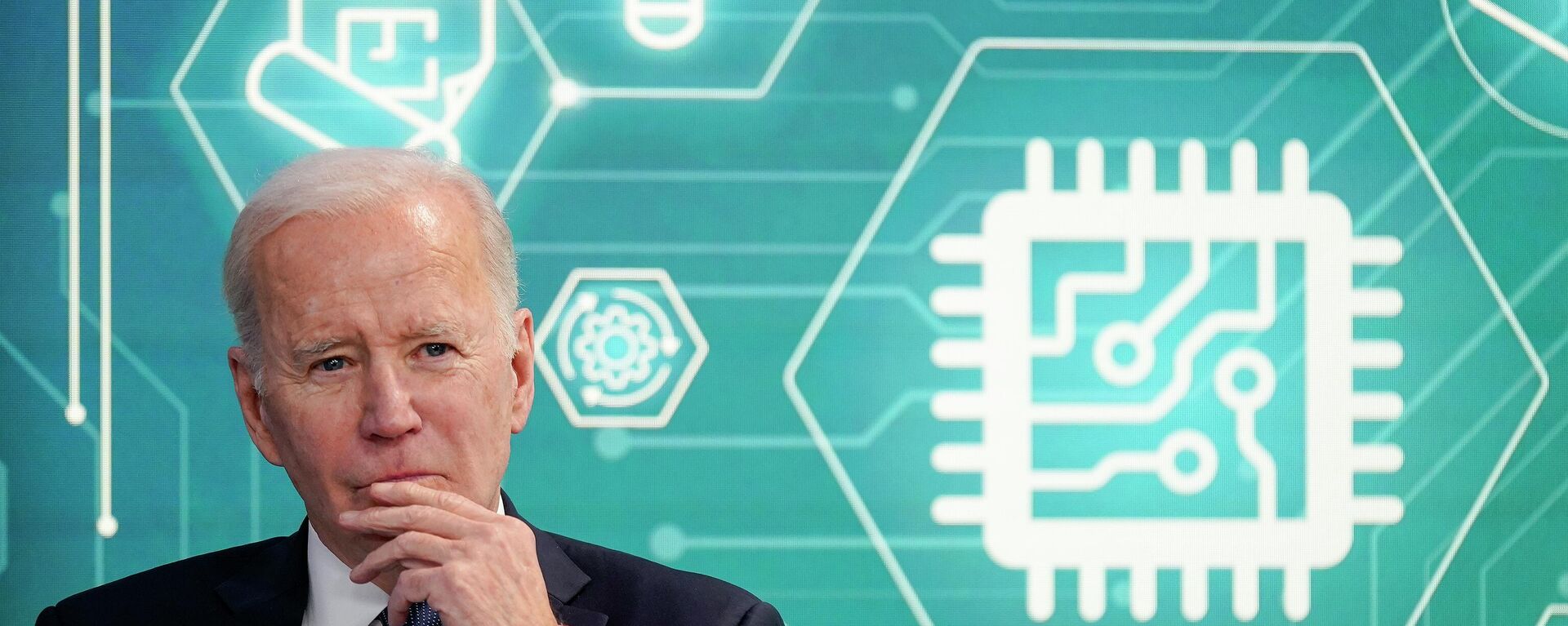https://sputnikglobe.com/20230331/chinese-foreign-ministry-says-chip-supply-chain-disruption-will-hurt-everyone-1108988891.html
Chinese Foreign Ministry Says Chip Supply Chain Disruption Will Hurt Everyone
Chinese Foreign Ministry Says Chip Supply Chain Disruption Will Hurt Everyone
Sputnik International
Chinese Foreign Ministry Spokesperson Mao Ning said on Friday that undermining the stability of global chip production and supply chains, the result of cooperative market rules and enterprise choices, would hurt the development of every country.
2023-03-31T11:05+0000
2023-03-31T11:05+0000
2023-06-19T12:46+0000
asia
china
us
south korea
japan
taiwan
https://cdn1.img.sputnikglobe.com/img/07e6/07/06/1097021313_0:34:3072:1762_1920x0_80_0_0_f67bdf78e879b084fba2226aff0d1cd6.jpg
Earlier in the day, Tokyo decided to tighten export controls for advanced chip manufacturing equipment to prevent the technology from being used for military purposes, adding 23 items to the restrictions. The measures were imposed on all but 42 countries and regions, with the United States, South Korea and Taiwan, which decided to restrict semiconductor exports to Beijing, covered by the exemptions. For exports to China and other countries, the registration procedure will become more complicated, requiring the permission of the Japanese Economy, Trade and Industry Ministry. Washington has long pressured Japan and the Netherlands to impose stricter export controls on China. Despite this, semiconductor exports from Japan to China have been growing due to the increasing demand for smartphones and data centers. Goods covered by the export restriction measures are produced by 10 Japanese companies, which will reportedly be granted non-military export permits. In this way, Japan has tried to respond to US requirements and at the same time minimize the impact on its companies.
https://sputnikglobe.com/20230301/bidens-semiconductor-subsidies-may-turn-into-taxpayer-funded-romp-as-asian-chip-giants-forge-ahead-1107913159.html
china
south korea
japan
taiwan
Sputnik International
feedback@sputniknews.com
+74956456601
MIA „Rossiya Segodnya“
2023
Sputnik International
feedback@sputniknews.com
+74956456601
MIA „Rossiya Segodnya“
News
en_EN
Sputnik International
feedback@sputniknews.com
+74956456601
MIA „Rossiya Segodnya“
Sputnik International
feedback@sputniknews.com
+74956456601
MIA „Rossiya Segodnya“
china, chip manufacturing, japan, south korea, taiwan, netherlands, global chip production, semiconductors, export controls
china, chip manufacturing, japan, south korea, taiwan, netherlands, global chip production, semiconductors, export controls
Chinese Foreign Ministry Says Chip Supply Chain Disruption Will Hurt Everyone
11:05 GMT 31.03.2023 (Updated: 12:46 GMT 19.06.2023) BEIJING (Sputnik) - Chinese Foreign Ministry Spokesperson Mao Ning said on Friday that undermining the stability of global chip production and supply chains, the result of cooperative market rules and enterprise choices, would hurt the development of every country.
Earlier in the day, Tokyo decided to tighten export controls for advanced chip manufacturing equipment to prevent the technology from being used for military purposes, adding 23 items to the restrictions. The measures were imposed on all but 42 countries and regions, with the United States, South Korea and Taiwan, which decided to restrict semiconductor exports to Beijing, covered by the exemptions. For exports to China and other countries, the registration procedure will become more complicated, requiring the permission of the Japanese Economy, Trade and Industry Ministry.
"The global semiconductor industrial and supply chains are shaped by the laws of market dynamics and the choices of businesses. To politicize, instrumentalize and weaponize trade and tech issues and destabilize the global industrial and supply chains will benefit no one and will eventually backfire," Mao told a briefing.
Washington has long pressured Japan and the Netherlands to impose stricter export controls on China. Despite this, semiconductor exports from Japan to China have been growing due to the increasing demand for smartphones and data centers. Goods covered by the export restriction measures are produced by 10 Japanese companies, which will reportedly be granted non-military export permits. In this way, Japan has tried to respond to US requirements and at the same time minimize the impact on its companies.



